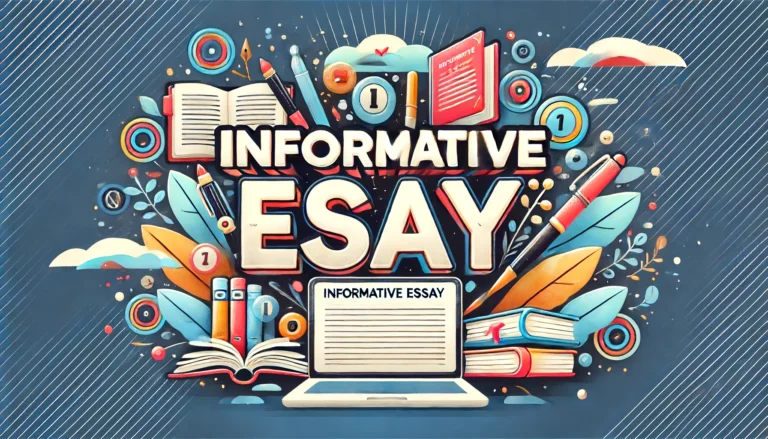Essay Writing Guides
How to Write an Informative Essay in 5 Steps


An informative essay is a type of academic writing that aims to educate the reader on a specific topic by providing well-researched facts and explanations. Unlike persuasive or argumentative essays, an informative essay does not seek to convince the reader of a particular viewpoint but rather to present a balanced and comprehensive understanding of the subject matter. This form of writing is essential in academic settings as it helps students develop their research, analytical, and communication skills while contributing valuable knowledge to their field of study.
This article will delve into the particulars of writing an informative essay, offering a step-by-step guide to help you craft a compelling and informative piece. We will cover the fundamental aspects, including the definition and structure of an informative essay, and provide practical tips on writing each section effectively. Additionally, we will include informative essay examples, address common questions such as the five parts of an informative essay, and offer strategies for writing engaging body paragraphs. By the end of this guide, you will be well-equipped to write an informative essay that is clear, concise, and insightful.
What is an Informative Essay?
An informative essay is a type of academic writing that aims to educate the reader on a specific topic by presenting well-researched facts and explanations. It provides a balanced and comprehensive understanding of the subject without attempting to persuade or argue a particular viewpoint. This essay format helps develop research, analytical, and communication skills, making it an essential component of academic education.
How is an Informative Essay Structured
An informative essay is structured into several key sections:
- Introduction: This section introduces the topic, provides background information, and includes a thesis statement that outlines the essay’s main points.
- Body Paragraphs: Each paragraph covers a specific aspect of the topic, supported by evidence and examples. Typically, there are at least three body paragraphs, each beginning with a topic sentence.
- Conclusion: This section summarizes the main points discussed in the essay, reinforces the thesis statement, and provides a final thought or call to action without introducing new information.

Never Written Informative essays before?
Professional writers across dozens of subjects can help you right now.
5 Steps for Writing an Informative Essay
- Choose a Topic
Select an informative essay topic that is interesting and has enough available information. Ensure the topic is neither too broad nor too narrow, allowing for a thorough exploration within the informative essay’s length. Consider your audience’s interests and the essay’s purpose when choosing.
- Conduct Research
Gather relevant information from credible sources such as academic journals, books, and reputable websites. Take notes and organize your research materials to ensure you cover all topic aspects. Verify the accuracy and reliability of your sources to maintain the informative essay’s credibility.
- Create an Outline
Plan the structure of your informative essay by organizing your main points and supporting details into a logical order. An outline helps ensure a coherent flow of information and keeps your writing focused. Typically, it includes an introduction, several body paragraphs, and a conclusion.
- Write the Draft
Begin by writing a strong introduction for your informative essay that captures the reader’s attention and presents the thesis statement. Develop each body paragraph with clear topic sentences, evidence, and explanations. Use transitions to maintain the flow between paragraphs, and conclude with a summary reinforcing the main points and thesis.
- Revise and Edit
Review your essay for clarity, coherence, and consistency. Check for grammatical errors, punctuation mistakes, and formatting issues. Make sure your information is accurate and that your argument is logically presented. Seek feedback from peers or mentors and refine your essay to improve its overall quality.
Suggested Informative Essay Outline
The suggested informative essay outline below is for an informative essay that explore the specific impacts of climate change on crop yields, growing seasons, and livestock, highlighting the urgent need for adaptive strategies in agriculture.
Topic: The Impact of Climate Change on Global Agriculture
INTRODUCTION
- Hook: A startling fact or statistic about climate change and agriculture.
- Background Information: Brief overview of climate change and its relevance to agriculture.
- Thesis Statement: Outline the main points that will be covered: effects on crop yields, changes in growing seasons, and impacts on livestock.
BODY PARAGRAPHS
Effects on Crop Yields
- Topic Sentence: Discuss how climate change affects crop yields.
- Supporting Details:
- Changes in temperature and precipitation patterns.
- Examples of affected crops (e.g., wheat, corn).
- Data and studies on yield reductions.
- Explanation: How these changes threaten food security.
Changes in Growing Seasons
- Topic Sentence: Explore how climate change alters growing seasons.
- Supporting Details:
- Shift in planting and harvesting times.
- Regional variations in growing season length.
- Impact on crop cycles and productivity.
- Explanation: Consequences for farmers and agricultural planning.
Impacts on Livestock
- Topic Sentence: Describe the effects of climate change on livestock.
- Supporting Details:
- Heat stress on animals.
- Changes in grazing patterns and forage availability.
- Increased vulnerability to diseases.
- Explanation: Implications for meat and dairy production.
Conclusion
- Restate Thesis: Summarize the main points discussed.
- Summary of Main Points: Briefly recap the effects on crop yields, growing seasons, and livestock.
- Final Thought: Emphasize the importance of addressing climate change for the future of global agriculture and food security.
This informative essay outline provides a clear structure for an informative essay on the impact of climate change on global agriculture, ensuring all relevant aspects are covered comprehensively.
Informative Essay Examples
Final Remarks
In this article, we have explored the essential aspects of writing an informative essay, from understanding its structure to following a clear, step-by-step process. We’ve covered how to effectively start your essay, structure it into coherent sections, and write compelling body paragraphs. Additionally, we addressed common questions about the parts of an informative essay, examples of informative writing, and detailed the steps necessary to craft a well-organized and insightful piece. With these guidelines, you are well-equipped to create an informative essay that educates and engages your readers.
If you find yourself struggling with any part of the writing process, remember that Masters Writers Essay Writer Service is here to help. Our team of experienced writers can assist you in writing a high-quality informative essay tailored to your specific needs. Whether you need help with topic selection, research, or structuring your essay, our experts are ready to provide the support you need to succeed. Let Masters Writers help you achieve your academic goals with confidence and ease.

Essay Deadline Just Around the Corner?
Streamline the writing progress with our expert service!
FAQs
What are the 5 parts of an informative essay?
An informative essay typically consists of five main parts:
- Title: A concise statement reflecting the essay’s main topic.
- Introduction: Introduces the topic and includes a thesis statement.
- Body Paragraphs: Each paragraph covers a specific aspect of the topic, supported by evidence and examples.
- Conclusion: Summarizes the main points and reinforces the thesis without introducing new information.
- References: Lists all the sources cited in the essay.
What are 5 examples of informative writing?
Five examples of informative writing include:
- Scientific Reports: Detailed accounts of experiments and their results.
- Encyclopedia Entries: Articles providing factual information on a wide range of topics.
- How-To Guides: Step-by-step instructions on how to perform a specific task.
- News Articles: Reports that provide factual information about recent events.
- Textbooks: Educational books that provide comprehensive information on a particular subject.
How to write an informative essay body paragraph?
To write an informative essay body paragraph, start with a clear topic sentence that introduces the main idea of the paragraph. Follow this with supporting sentences that provide evidence, examples, and explanations related to the topic sentence. Use credible sources to back up your information and ensure that each point is logically connected to the next. Conclude the paragraph with a sentence that summarizes the main idea and transitions smoothly to the next paragraph.
What are the 7 steps of an essay?
The seven steps of writing an essay are:
- Choose a Topic: Select a subject that interests you and is appropriate for the assignment.
- Conduct Research: Gather information from credible sources relevant to your topic.
- Create an Outline: Organize your main points and supporting details into a logical structure.
- Write a Thesis Statement: Develop a clear and concise statement that presents the main argument or purpose of your essay.
- Write the Introduction: Introduce the topic, provide background information, and include your thesis statement.
- Write the Body Paragraphs: Develop each paragraph around a main point, supported by evidence and examples.
- Write the Conclusion: Summarize the main points, restate the thesis in light of the evidence presented, and provide a final thought or call to action.

